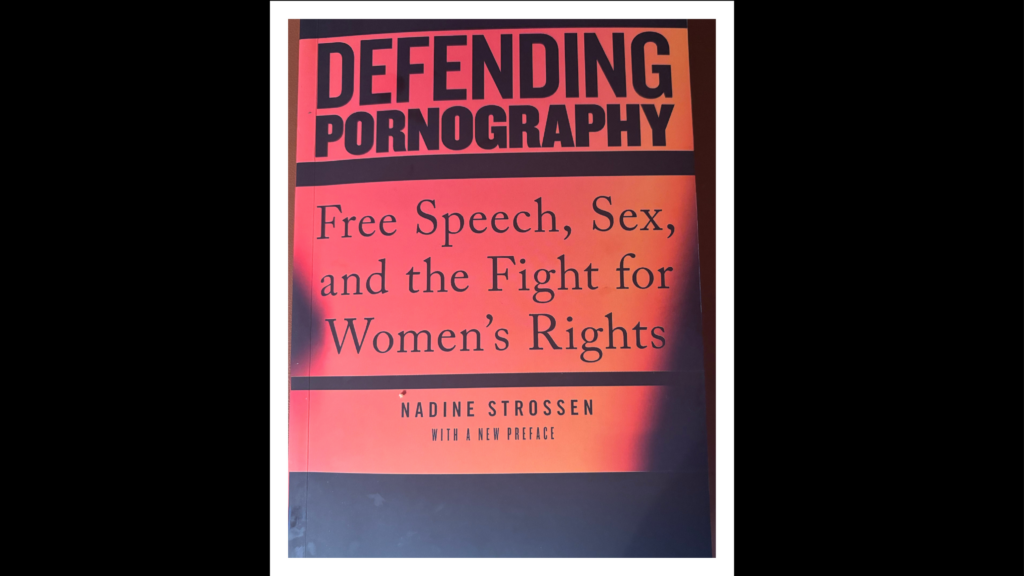When Nadine Strossen’s e-book Defending Pornography: Free Speech, Intercourse, and the Battle for Ladies’s Rights was first printed in 1995, America was within the grips of a serious cultural schism over erotic expression. Conservatives and an influential cadre of feminists had teamed as much as promote porn censorship, with some success. The radfem contingent claimed the existence of authorized porn was an affront to girls—hindering their struggle for equality and driving violence towards them—and thus argued that free speech was incompatible with feminism. However feminists like Strossen did not settle for this. A New York Legislation Faculty professor who headed the American Civil Liberties Union (ACLU) from 1991 to 2008, Strossen argued that opposing censorship was not solely essential as an summary liberal precept however was in itself good for selling girls’s rights.
Almost 1 / 4 century later, Strossen’s arguments are nonetheless a significant antidote to a lot of what one hears from distinguished feminists. And because the left-right anti-porn alliance continues to wield affect in statehouses and in Congress, a model new reissue of Defending Pornography is a must-read for a brand new era of free speech defenders and libertarian feminists.
I talked to Strossen final week about why she initially wrote the e-book and why it is nonetheless related right this moment. I will be publishing our chat in two elements within the Intercourse & Tech publication this week, so keep tuned for the second half on Wednesday. The next transcript of our dialog has been mildly edited for size and readability.
Need extra on intercourse, know-how, bodily autonomy, legislation, and on-line tradition? Subscribe to Intercourse & Tech from Cause and Elizabeth Nolan Brown.
What compelled you to first write Defending Pornography?
Strossen: I first wrote Defending Pornography method again in 1994 as a result of there was then prevalent throughout the ideological spectrum a really damaging false impression that one had to decide on between being a feminist and being a free speech advocate, and that if one actually supported girls’s rights, girls’s security, girls’s dignity, girls’s equality, then one needed to assist censorship—particularly of so-called “pornography” or sexually express, sexually suggestive expression. And it wasn’t practically as well-known accurately that there have been many people who strongly opposed censoring pornography. (And by the best way, I at all times say “pornography” with citation marks round it.)
There have been many people who opposed censoring pornography, not solely due to our dedication to core free speech ideas, but in addition, independently, exactly due to our dedication to feminist objectives and ideas, and our understanding—primarily based on widespread longstanding expertise, in the US and elsewhere—that regardless of how well-intended, censorship of pornography would find yourself doing girls’s rights way more hurt than good.


May you perhaps elaborate on that a little bit bit, the way it winds up doing extra hurt than good?
Since then, Liz, I’ve had the chance to put in writing about other forms of controversial expression, together with—and once more, with scare quotes—so-called “hate speech,” so-called “disinformation” or “misinformation,” so-called “extremist” speech. And I’ve come to see that every one of those efforts to censor all of those controversial sorts of speech, together with pornography, endure from the identical elementary flaws. All of these flaws emanate from the irreducibly subjective and obscure nature of the idea, which implies that whoever the imposing authority is—whether or not the federal government, whether or not particular person residents, as would’ve occurred beneath the mannequin anti-pornography legislation that was proposed by the so-called radical feminists—has primarily unfettered discretion to determine what inside that inherently elusive and manipulable idea, on this case pornography, is inconsistent with their values. And that implies that for the remainder of us who disagree with a specific, particular person, subjective idea of both sexual speech or hate speech or disinformation, that our freedom and our equality is undermined.
Now, since girls and feminists and advocates of reproductive freedom and LGBTQ people and advocates of their rights—by means of many historic durations, and together with in the US—have been within the minority, not less than in lots of communities, it’s utterly predictable that legal guidelines focusing on pornography, obscenity, every other disfavored class of sexual expression constantly have disproportionately been enforced to suppress these views, views which can be particularly essential for girls’s rights and security and dignity and well being and equality and lives.
It is at all times wonderful to me how few individuals appear to understand that.
You realize, for thus a few years, these of us within the feminist anti-censorship motion would predict that if the so-called radical feminist imaginative and prescient of unlawful pornography had been enacted—and their idea was characteristically obscure and subjective, any sexual expression that’s subordinating to girls or demeaning or dehumanizing or degrading—that their advocacy can be among the many expression that might be the primary to be focused.
And certain sufficient, that prediction instantly got here to move. Andrea Dworkin, a author, and Catharine McKinnon, a legislation professor—their idea of unlawful pornography was adopted by the Canadian Supreme Courtroom [in 1992]. Instantly, Canadian Customs seized quite a few books on the U.S.–Canada border that had been deemed to be inconsistent with that idea. And amongst these books had been books that had been written by Andrea Dworkin herself. As a result of within the technique of denouncing pornography as being degrading and dehumanizing, she in fact goes to nice lengths to explain it. And you possibly can form of have schadenfreude and “I advised you so.” Nevertheless it was a tragic proof of idea, if you’ll.
There was a really energetic girls’s anti-pornography group in lots of elements of the nation, together with New York, referred to as Ladies Towards Pornography. And as was attribute of those teams, they’d have large desk shows on sidewalks the place they’d show examples of what they thought-about to be essentially the most misogynistic, violent, horrific pornography. And one which I bear in mind, which was fairly well-known or notorious, was a canopy picture from Hustler journal which confirmed a lady being stuffed right into a meat grinder. And among the many locations the place that they had these shows was Grand Central Station, a serious commuting level in New York. And commuters had been complaining about how upsetting and horrifying these photographs had been, so the authorities at Grand Central Station booted out Ladies Towards Pornography. And guess what they did? They went to the New York workplace of the ACLU and requested us to defend their proper to show the pornography that they had been advocating ought to be banned and criminalized.


That is wonderful. I like that story.
I imply, no sense of the irony right here, proper? I assume it would not should be stated, however—simply to underscore—any expression can be utilized to convey utterly completely different messages. They had been utilizing what they thought-about to be essentially the most harmful expression, presumably to not stimulate violence and discrimination towards girls however for precisely the alternative function, proper? In order that they themselves had been simply proving the very over-simplistic cause-and-effect assumption that underlies the censorial impetus that, you already know, you see a picture that is degrading, and subsequently you are going to undertake concepts which can be degrading and it’d even lead you to have interaction in degrading conduct. Could possibly be precisely the alternative.
You had been a part of a bunch, with Joan Kennedy Taylor, referred to as Feminists For Free Expression, right?
Sure, I used to be one of many co-founders of that group. I bear in mind engaged on the founding paperwork most intently with Marsha Pally and Marjorie Heins, who was a long-time lawyer with the ACLU Arts Censorship Challenge. Joan was one of many early leaders and activists in that motion as effectively.
Did individuals see it as an oxymoron on the time, that feminists had been combating at no cost expression? As a result of I do know once I speak about this right this moment, everybody’s like, “No, feminists hate free expression.”
The pendulum saved swinging backwards and forwards, Liz. Actually, within the ’70s and the start of the second wave of the ladies’s motion, and thru many of the eighties in many of the nation, feminists—together with all advocates of equal rights and human rights—had been simply assumed to be, and assumed ourselves to be, allies of free speech.
I actually bear in mind the very first time I heard the so-called feminist pro-censorship, anti-pornography argument. I imply, it was so surprising to me that I actually, all these a long time later, have an entire visible reminiscence of once I heard that argument. I used to be attending a conference at the moment. I lived in my childhood dwelling metropolis, which I returned to after legislation college, of Minneapolis. And I used to be chief of the Minnesota Ladies’s Political Caucus, which was a nonpartisan group looking for to extend girls’s participation in politics and politicians’ concern for girls’s points. And anyone talked concerning the argument that was then being pioneered by Dworkin and McKinnon in a seminar on the College of Minnesota Legislation Faculty. That is the place they first aired this argument, and—I do not know if you already know the historical past, however it was truly enacted into legislation by the Minnesota Minneapolis Metropolis Council [in 1983], vetoed by a remarkably brave, fantastic mayor named Don Frazier, whose spouse, curiously sufficient, was an internationally-renowned main feminist, Arvonne Frazier. However anyway, it was such a surprising argument.
However in a short time—because of, I’ve to say, very charismatic arguments by McKinnon particularly—that motion actually took off. And that is why there was an earlier counterorganization referred to as FACT, the Feminist Anti-Censorship Taskforce, that was spearheaded by Sylvia Legislation, a feminist professor who was additionally at NYU Legislation Faculty, who was very concerned with the ACLU, and Nan Hunter, who was, I consider both the primary or second—she could have been the very first—director of the ACLU’s then-new lesbian and homosexual rights undertaking. And FACT truly filed a really influential temporary within the first authorized problem to the primary McKinnon-Dworkin legislation that was truly enacted with no mayoral veto, that went into impact in Indianapolis [in 1984].
I do not know whether or not [U.S. District Court for the Southern District of Indiana Judge Sarah Evans Barker] expressly cited the FACT temporary, however she undoubtedly integrated its argument in her opinion, making the purpose that it was particularly advocates of girls’s rights who relied on strong free speech and that this legislation, in her view, was antithetical to girls’s equality in addition to to free speech. After that, the U.S. Supreme Courtroom affirmed the decrease courtroom choice—effectively, first, the Seventh Circuit affirmed it, in a superb opinion. The U.S. Supreme Courtroom summarily affirmed it [in 1986].
We thought that the struggle was over, as a authorized matter. So FACT form of disbanded. It jogs my memory a little bit little bit of what occurred with Roe vs. Wade, the place the pro-choice motion thought, “We have succeeded, now we will fold our tents and go dwelling,” and the opposite aspect turns into extra galvanized. And that is what occurred right here. The novel feminists turned extra organized by way of influencing the cultural dialogue, together with on campus. They harnessed themselves to the parallel motion that was creating on campus to outlaw hate speech extra typically, of which this idea of sexist pornography is a subset of hate speech—sexually express hate speech that discriminates towards girls. So these two actions had been propelling one another in tandem.
And bizarrely—by way of the utterly completely different ideology—this motion was fueled by, and in flip helped to gasoline, a motion coming from the correct, as embodied most influentially by the Meese Pornography Fee, named after Ed Meese, the lawyer normal beneath Ronald Reagan. It issued a report in 1986 which embraced a cultural and non secular and political conservative opposition to pornography, utilizing the identical stigmatizing time period, denoting of their case, sexually express expression that undermines so-called “conventional household values” that endangered the so-called “conventional American household.” And regardless of their utterly antithetical views concerning the position of girls and of girls’s rights and equality, they had been utterly blissful to make widespread trigger in advocating for restrictions on sexual expression.
So there was one thing that was referred to as the Pornography Victims Compensation Act that had been proposed in Congress with bipartisan assist, which might’ve been a federal model of the Dworkin-McKinnon anti-pornography legislation. It mainly would have allowed anyone who had been topic to sexual assault or intercourse discrimination to sue creators, purveyors, distributors of sexual expression as allegedly having induced the damaging attitudes that led to the damaging actions towards girls. And this was actually poised to be crusing by means of Congress. The conservatives had been supporting it as a result of they hated pornography for his or her causes, and the liberals had been supporting it as a result of the view was very prevalent that “feminists assist this.” So that you’re completely proper, that place turned equated with feminism. Feminists for Free Expression was based particularly to counter that legislation and to defy this widespread assumption that feminists assist censorship. And we despatched a letter to Congress that we had been advised was very influential in terminating that laws that by no means was enacted, luckily.
You write within the new preface to the e-book about how calling them radical feminists—this group that actually opposes porn and intercourse work and may be very pro-censorship—is a misnomer. Are you able to clarify why you say that?
It was in the end a view that may be very anti-sex, which I do not see as a radical view in any respect. And that isn’t simply hyperbolic conclusion—I’ve acquired direct quotes, repeatedly, from MacKinnon and Dworkin the place they speak about intercourse as being inherently degrading to girls. They expressly equate girls with youngsters within the legal guidelines and of their writing, in order that these of us who suppose that we get pleasure from intercourse, not to mention those that suppose that we’d get pleasure from and even, heaven forbid, performing for or creating pornography… Certainly one of our different leaders in Feminists for Free Expression was Candida Royalle, and I used to be so blissful to see that lately her papers have surfaced and she or he’s being written about, however she and Veronica Vera and Nina Hartley, different former pornography performers and creators of pornography, together with what they thought-about to be particularly empowering and liberating and joyful for girls, had been a part of this motion as effectively. However the MacKinnon-Dworkin line was that these of us who suppose that we assist this freedom and even get pleasure from exercising it are victims of false consciousness, and we’ve to be protected towards ourselves simply the best way youngsters are. And I imply MacKinnon actually equated girls with youngsters in being inherently incapable of significant consent within the realm of the sexual, together with sexual expression. That, to me, is the alternative of a progressive, radical view.
Keep turned for half two of this interview in Wednesday’s publication.
Extra Intercourse & Tech
• Washington state Gov. Jay Inslee has signed a “stippers’ invoice of rights.”
• Bucking the development, Missouri lawmakers have rejected a invoice that might required parental consent for individuals to affix social media.
• Is your automotive spying on you?
• The return of Anthony Comstock: The 151-year-old Comstock legislation “banned…all the pieces starting from contraception to pornography. It stays one of the obtrusive assaults on free speech ideas in our federal code.” Now it is again within the battle over abortion tablets, as Jonathan Turley explores right here.
At this time’s Picture


